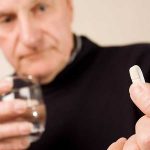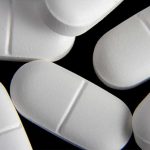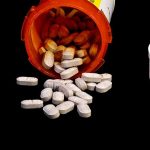Vicodin is a prescription drug made of hydrocodone and acetaminophen. It’s an opioid painkiller prescribed for moderate to severe pain.
It comes as a pill that should be taken orally and swallowed whole. But some people crush the pills and snort the powder, anticipating a rush as the drug reaches their brain.
Vicodin Side Effects
While Vicodin can be an effective pain reliever when taken as prescribed, it may come with side effects. People who abuse Vicodin tend to take it in higher doses and more frequently than prescribed. Their dosage and how often they use the drug increases as addiction progresses.
More exposure to Vicodin increases the risk of adverse side effects like:
- dizziness
- drowsiness
- light-headedness
- sedation
- nausea
- vomiting
- constipation
- trouble with urination
- rashy skin
- pinpoint pupils
- dry mouth and throat
- mood swings
Some Vicodin side effects can be severe, such as:
- muscle stiffness or twitching
- weakness
- loss of appetite
- loss of coordination
- chest pain or tightness
- racing heart rate
- slow or uneven breathing
- confusion
- hallucinations
Dangers Of Snorting Vicodin
Snorting Vicodin (insufflation) is harmful to your physical and mental health. There are many risks associated with snorting hydrocodone and drug abuse.
Damage To The Nose
Hydrocodone, acetaminophen, and the other fillers that make up Vicodin pills aren’t gentle on the nasal passages. They can irritate, inflame, and destroy the inside of your nose.
Damage to the nose from snorting Vicodin may include:
- runny nose
- nose bleeds
- sores in the nose
- no sense of smell
- whistling sound when breathing
- decreased nasal mucus
- damaged cilia (hair in the nose that traps foreign particles)
- holes in the septum (wall between the nostrils)
- holes in the palate (roof of the mouth)
If erosion occurs to the extent of making holes in the roof of your mouth, it can be difficult to eat, swallow, and breathe.
Damage To The Throat & Lungs
When you snort a drug, some of it can drip down the back of your throat, onto your vocal cords, and into your lungs. This can lead to:
- throat ulcers
- a sore throat
- a hoarse voice
- worsened asthma
- lung inflammation
Disease Transmission
Sharing drug snorting paraphernalia—such as rolled paper, straws, or hollowed-out pens—comes with the risk of getting an infectious disease. Hepatitis C (HCV) is just one virus that can be spread through nasal mucus.
HCV can also be spread through blood. When you’re snorting Vicodin, it’s common for the sensitive blood vessels in your nose to bleed, raising the chance of disease transmission.
Vicodin Overdose
Snorting Vicodin (hydrocodone and acetaminophen) increases the risk of overdose.
When you swallow a Vicodin tablet, it goes through your digestive system before being gradually introduced into your bloodstream. If you snort it, the drug enters the bloodstream immediately and all at once through tiny nasal blood vessels.
A hydrocodone overdose can be deadly. As a central nervous system depressant, hydrocodone slows down your respiratory system. Too much Vicodin can make it difficult to breathe, which could cause a coma or death.
Brain damage can also occur from a lack of oxygen during an opioid overdose.
If you buy Vicodin on the street, there’s no guarantee that it’s legitimate. It’s more likely that it’s cut with other substances that could damage your nose and overall health. It may be laced with fentanyl, a potent opioid drug that’s responsible for a spike in opioid overdoses in recent years.
Hydrocodone Addiction & Dependence
Hydrocodone, the main active ingredient in Vicodin, can cause tolerance, physical dependence, and addiction.
Even when you take it as prescribed, you may eventually need more Vicodin to get the same pain relief (tolerance). Your body may start to rely on it to function and have withdrawal symptoms if you stop taking it (physical dependence).
Abusing Vicodin can change the way your brain is structured so that it has drug cravings and drives you to take Vicodin even when it’s bad for your health and relationships (addiction).
More Intense Withdrawal Symptoms
Snorting Vicodin often produces a more potent effect. If you’re used to that rush, you may have more intense withdrawal symptoms when you try to go without it. Vicodin abuse also leads to taking more and more Vicodin, which leads to more dependence (physical and mental).
The more dependent you are on a drug, the more difficult the withdrawal process is likely to be. If you hope to detox from Vicodin, be sure you have support.
Treatment For Vicodin Addiction
If you or a loved one are living with Vicodin addiction, we’re here to help. At Northeast Addictions Treatment Center, we offer individualized outpatient addiction treatment programs.
Our other Massachusetts drug rehab facilities provide detox programs and inpatient treatment as well.
The most effective care for opioid addiction is a whole-person approach. Behavioral therapy, exercise, and meditation may be part of a treatment program that nurtures the mind, body, and spirit.
Reach out to our compassionate team of specialists at Northeast Addictions Treatment Center today to learn more.
Sources
- National Center for Biotechnology Information — Hydrocodone sensitivity leading to hypersensitivity pneumonitis
- Oxford Academic — Hepatitis C Virus RNA Is Commonly Detectable in Rectal and Nasal Fluids of Patients With High Viremia
- ResearchGate — Necrosis of the Intranasal Structures and Soft Palate as a Result of Heroin Snorting: A Case Series
- U.S. National Library of Medicine: DailyMed — Label: Hydrocodone bitartrate and acetaminophen tablet
- U.S. National Library of Medicine: MedlinePlus — Hydrocodone combination products
Written by
Northeast Addition Editorial Team
©2024 Northeast Addition Center | All Rights Reserved
This page does not provide medical advice.




